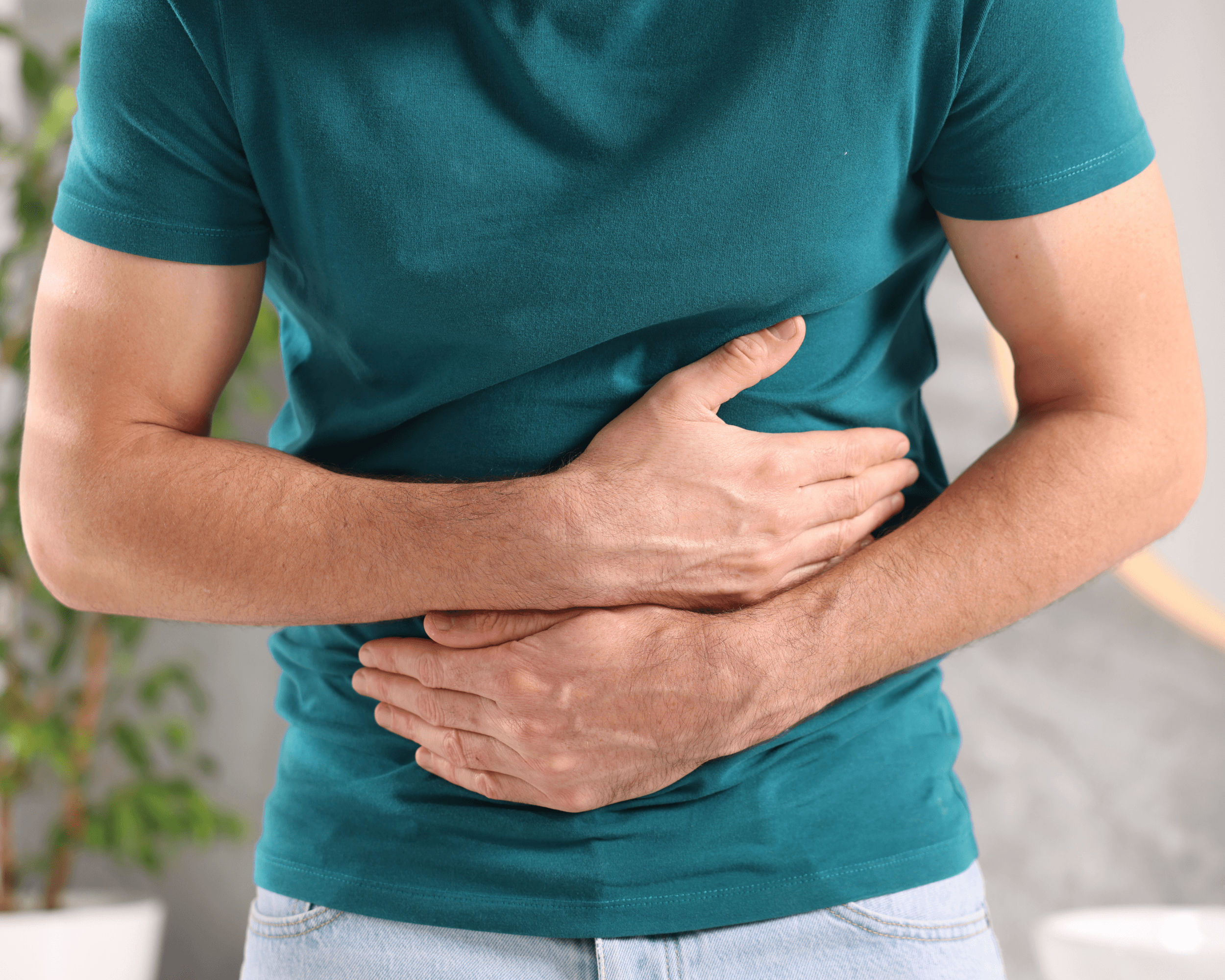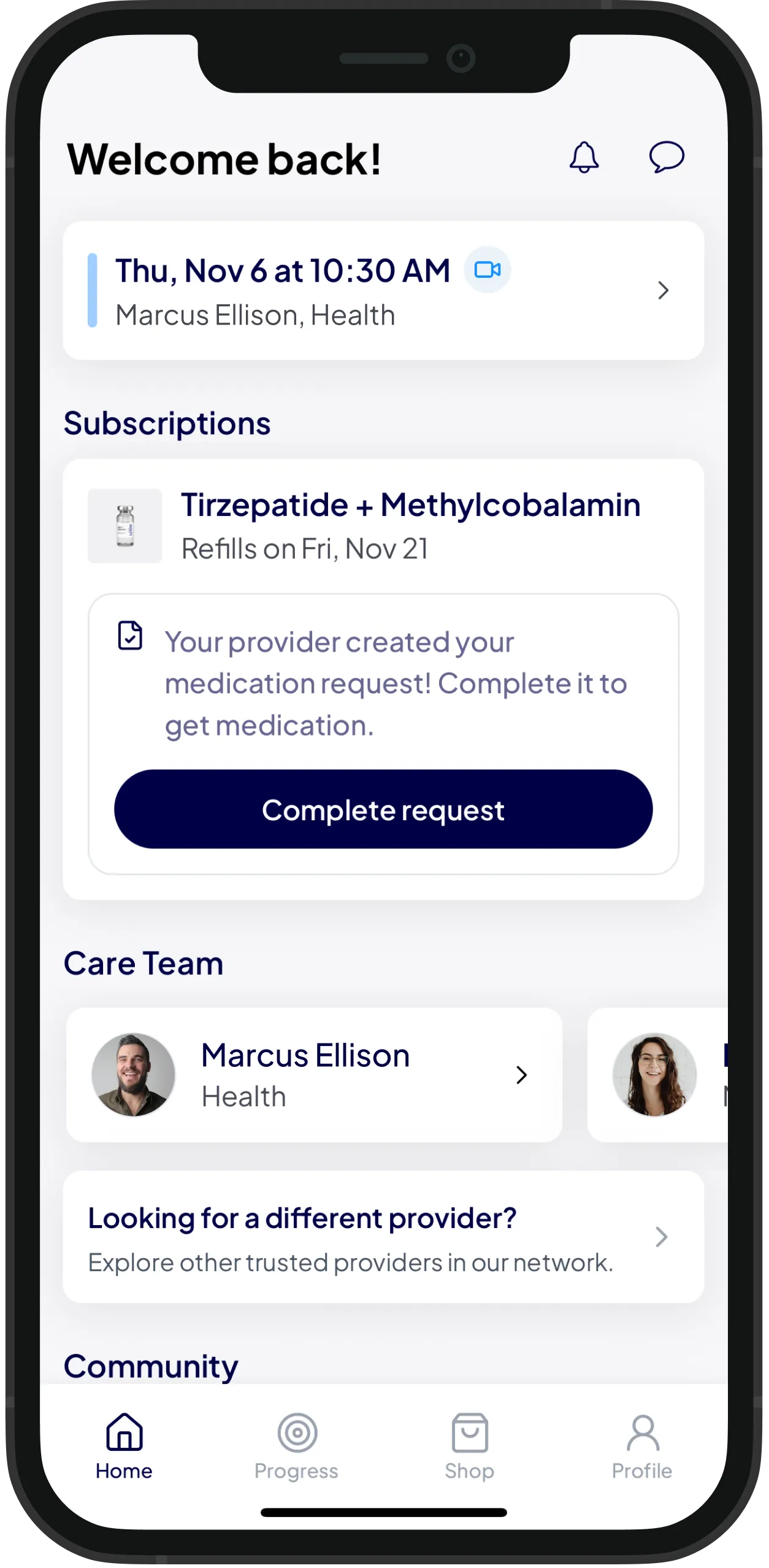Ready to transform your health?
Unlock access to expert guidance and a weight care plan crafted just for you.
Ready to transform your health?
Unlock access to expert guidance and a weight care plan crafted just for you.
Similar Articles
Similar Articles


Is Zofran Safe with Semaglutide? What You Need to Know
Is Zofran Safe with Semaglutide? What You Need to Know


Does Semaglutide Cause Headaches? What You Should Know
Does Semaglutide Cause Headaches? What You Should Know


CBL-514: A New Injectable Approach to Targeted Fat Reduction
CBL-514: A New Injectable Approach to Targeted Fat Reduction
Obesogens Causing Difficulty Losing Weight
Obesogens Causing Difficulty Losing Weight
Obesogens Causing Difficulty Losing Weight
Obesogens are a group of chemicals that can contribute to difficulty losing weight but by reducing your exposure to these chemicals and focusing on healthy lifestyle habits, you can support your body's natural weight loss process.
Obesogens are a group of chemicals that can contribute to difficulty losing weight but by reducing your exposure to these chemicals and focusing on healthy lifestyle habits, you can support your body's natural weight loss process.
Obesogens are a group of chemicals that can contribute to difficulty losing weight but by reducing your exposure to these chemicals and focusing on healthy lifestyle habits, you can support your body's natural weight loss process.



Table of Contents
Table of Contents
Table of Contents
Obesogens?! Yikes!
Where do obesogens come from?
Why obesogens mess with our bodies:
Tips on avoiding obesogens:
Wrap-Up
Obesogens?! Yikes!
Where do obesogens come from?
Why obesogens mess with our bodies:
Tips on avoiding obesogens:
Wrap-Up
Obesogens?! Yikes!
Where do obesogens come from?
Why obesogens mess with our bodies:
Tips on avoiding obesogens:
Wrap-Up
Obesogens?! Yikes!
Obesogens are a group of chemicals that have been shown to contribute to weight gain and obesity. These chemicals are found in many everyday products, such as plastics, pesticides, and food additives. Research has shown that exposure to obesogens can cause a variety of health problems, including difficulty losing weight! In this blog post, we will unpack more information on obesogens, how they impact our bodies, and will discuss how to avoid them.
Where do obesogens come from?
One of the most common ways that people are exposed to obesogens is through their diet. Many processed foods contain additives that can act as obesogens, such as high fructose corn syrup and artificial sweeteners. Pesticides/fungicides used in agriculture can also contaminate the food supply.
In addition to diet, people can be exposed to obesogens through their environment. Plastics, for example, contain chemicals such as bisphenol-A (BPA) that can act as obesogens. BPA is commonly found in plastic water bottles, food containers, and other everyday products. For a longer list of obesogens and more information on how we make contact with them, check out this document.
Why obesogens mess with our bodies:
Obesogens disrupt the body's natural hormonal balance, leading to weight gain and other health problems. These chemicals can interfere with the body's metabolism, causing it to store fat instead of burning it. They can also disrupt the body's hunger signals, making it harder to feel full and satisfied after eating. Crazy, right?
In a research article about the obesogen theory, a recent human diet-induced weight loss study was quoted because it showed that, while all subjects lost weight comparably when calories were restricted, those with the highest baseline plasma (blood) levels of perfluoroaklyl substances (“PFAs”, which are found in clothing, carpets, adhesives, non-stick cookware, and more) had lower resting metabolic rates and regained weight more rapidly (1).
Tips on avoiding obesogens:
So, what can you do if you suspect that obesogens are contributing to your difficulty losing weight? One important step is to try to reduce your exposure to these chemicals. This can involve making changes to your diet, such as eating more whole foods and avoiding processed foods that contain additives. It can also involve making changes to your environment, such as avoiding plastic products whenever possible.
For the next generation, spreading the word on obesogens is important because, according to many studies, obesogens play a big role in dictating future health from a very young age (in fetuses and newborns). This is because very young humans lack the physiological protective mechanisms that are fully functioning in adults (e.g., DNA repair ability, liver metabolism and detoxifying enzyme action, a competent immune system, and the blood/brain barrier) (2). If you are pregnant, you may want to consider the possible obesogens in the baby products that you use.
Wrap-Up
The take-home message here is that obesogens are a group of chemicals that can contribute to difficulty losing weight. By reducing your exposure to these chemicals and focusing on healthy lifestyle habits, you can support your body's natural weight loss processes and improve your overall health and well-being. Nobody lives in a bubble, and exposure to obesogens is inevitable. But hopefully, being more aware of where they come from can help you to be more mindful in your day-to-day lifestyle choices that can decrease your exposure to these pesky entities floating around our society.
In addition to reducing your exposure to obesogens, it's also important to focus on healthy lifestyle habits that can support weight loss. This includes regular exercise, getting enough sleep, and managing stress levels. These habits can help to support your body's natural metabolism and hormone balance, making it easier to lose weight.
Of course, there are tons of other factors that contribute to obesity, and weight loss can be incredibly difficult. If you would like to learn more about options like medication-assisted weight loss, head over to Mochi Health, where physicians with extra training in obesity medicine can help you learn more about your options and tailor a plan to help you meet your health goals.
This post was written by our team of health writers for informational purposes only and does not constitute medical advice. Always consult your doctor or healthcare provider for personalized guidance regarding your health. Ozempic®, Wegovy®, Mounjaro®, and Zepbound® and their delivery device are registered trademarks. Mochi Health is a telehealth clinic that offers prescriptions for these products by medical necessity only as determined by a licensed health provider.
Sources
Heindel JJ, Blumberg B. Environmental Obesogens: Mechanisms and Controversies. Annu Rev Pharmacol Toxicol. 2019;59:89-106. doi:10.1146/annurev-pharmtox-010818-021304
Shahnazaryan U, Wójcik M, Bednarczuk T, Kuryłowicz A. Role of Obesogens in the Pathogenesis of Obesity. Medicina (Kaunas). 2019;55(9):515. Published 2019 Aug 21. doi:10.3390/medicina55090515
Obesogens?! Yikes!
Obesogens are a group of chemicals that have been shown to contribute to weight gain and obesity. These chemicals are found in many everyday products, such as plastics, pesticides, and food additives. Research has shown that exposure to obesogens can cause a variety of health problems, including difficulty losing weight! In this blog post, we will unpack more information on obesogens, how they impact our bodies, and will discuss how to avoid them.
Where do obesogens come from?
One of the most common ways that people are exposed to obesogens is through their diet. Many processed foods contain additives that can act as obesogens, such as high fructose corn syrup and artificial sweeteners. Pesticides/fungicides used in agriculture can also contaminate the food supply.
In addition to diet, people can be exposed to obesogens through their environment. Plastics, for example, contain chemicals such as bisphenol-A (BPA) that can act as obesogens. BPA is commonly found in plastic water bottles, food containers, and other everyday products. For a longer list of obesogens and more information on how we make contact with them, check out this document.
Why obesogens mess with our bodies:
Obesogens disrupt the body's natural hormonal balance, leading to weight gain and other health problems. These chemicals can interfere with the body's metabolism, causing it to store fat instead of burning it. They can also disrupt the body's hunger signals, making it harder to feel full and satisfied after eating. Crazy, right?
In a research article about the obesogen theory, a recent human diet-induced weight loss study was quoted because it showed that, while all subjects lost weight comparably when calories were restricted, those with the highest baseline plasma (blood) levels of perfluoroaklyl substances (“PFAs”, which are found in clothing, carpets, adhesives, non-stick cookware, and more) had lower resting metabolic rates and regained weight more rapidly (1).
Tips on avoiding obesogens:
So, what can you do if you suspect that obesogens are contributing to your difficulty losing weight? One important step is to try to reduce your exposure to these chemicals. This can involve making changes to your diet, such as eating more whole foods and avoiding processed foods that contain additives. It can also involve making changes to your environment, such as avoiding plastic products whenever possible.
For the next generation, spreading the word on obesogens is important because, according to many studies, obesogens play a big role in dictating future health from a very young age (in fetuses and newborns). This is because very young humans lack the physiological protective mechanisms that are fully functioning in adults (e.g., DNA repair ability, liver metabolism and detoxifying enzyme action, a competent immune system, and the blood/brain barrier) (2). If you are pregnant, you may want to consider the possible obesogens in the baby products that you use.
Wrap-Up
The take-home message here is that obesogens are a group of chemicals that can contribute to difficulty losing weight. By reducing your exposure to these chemicals and focusing on healthy lifestyle habits, you can support your body's natural weight loss processes and improve your overall health and well-being. Nobody lives in a bubble, and exposure to obesogens is inevitable. But hopefully, being more aware of where they come from can help you to be more mindful in your day-to-day lifestyle choices that can decrease your exposure to these pesky entities floating around our society.
In addition to reducing your exposure to obesogens, it's also important to focus on healthy lifestyle habits that can support weight loss. This includes regular exercise, getting enough sleep, and managing stress levels. These habits can help to support your body's natural metabolism and hormone balance, making it easier to lose weight.
Of course, there are tons of other factors that contribute to obesity, and weight loss can be incredibly difficult. If you would like to learn more about options like medication-assisted weight loss, head over to Mochi Health, where physicians with extra training in obesity medicine can help you learn more about your options and tailor a plan to help you meet your health goals.
This post was written by our team of health writers for informational purposes only and does not constitute medical advice. Always consult your doctor or healthcare provider for personalized guidance regarding your health. Ozempic®, Wegovy®, Mounjaro®, and Zepbound® and their delivery device are registered trademarks. Mochi Health is a telehealth clinic that offers prescriptions for these products by medical necessity only as determined by a licensed health provider.
Sources
Heindel JJ, Blumberg B. Environmental Obesogens: Mechanisms and Controversies. Annu Rev Pharmacol Toxicol. 2019;59:89-106. doi:10.1146/annurev-pharmtox-010818-021304
Shahnazaryan U, Wójcik M, Bednarczuk T, Kuryłowicz A. Role of Obesogens in the Pathogenesis of Obesity. Medicina (Kaunas). 2019;55(9):515. Published 2019 Aug 21. doi:10.3390/medicina55090515
Obesogens?! Yikes!
Obesogens are a group of chemicals that have been shown to contribute to weight gain and obesity. These chemicals are found in many everyday products, such as plastics, pesticides, and food additives. Research has shown that exposure to obesogens can cause a variety of health problems, including difficulty losing weight! In this blog post, we will unpack more information on obesogens, how they impact our bodies, and will discuss how to avoid them.
Where do obesogens come from?
One of the most common ways that people are exposed to obesogens is through their diet. Many processed foods contain additives that can act as obesogens, such as high fructose corn syrup and artificial sweeteners. Pesticides/fungicides used in agriculture can also contaminate the food supply.
In addition to diet, people can be exposed to obesogens through their environment. Plastics, for example, contain chemicals such as bisphenol-A (BPA) that can act as obesogens. BPA is commonly found in plastic water bottles, food containers, and other everyday products. For a longer list of obesogens and more information on how we make contact with them, check out this document.
Why obesogens mess with our bodies:
Obesogens disrupt the body's natural hormonal balance, leading to weight gain and other health problems. These chemicals can interfere with the body's metabolism, causing it to store fat instead of burning it. They can also disrupt the body's hunger signals, making it harder to feel full and satisfied after eating. Crazy, right?
In a research article about the obesogen theory, a recent human diet-induced weight loss study was quoted because it showed that, while all subjects lost weight comparably when calories were restricted, those with the highest baseline plasma (blood) levels of perfluoroaklyl substances (“PFAs”, which are found in clothing, carpets, adhesives, non-stick cookware, and more) had lower resting metabolic rates and regained weight more rapidly (1).
Tips on avoiding obesogens:
So, what can you do if you suspect that obesogens are contributing to your difficulty losing weight? One important step is to try to reduce your exposure to these chemicals. This can involve making changes to your diet, such as eating more whole foods and avoiding processed foods that contain additives. It can also involve making changes to your environment, such as avoiding plastic products whenever possible.
For the next generation, spreading the word on obesogens is important because, according to many studies, obesogens play a big role in dictating future health from a very young age (in fetuses and newborns). This is because very young humans lack the physiological protective mechanisms that are fully functioning in adults (e.g., DNA repair ability, liver metabolism and detoxifying enzyme action, a competent immune system, and the blood/brain barrier) (2). If you are pregnant, you may want to consider the possible obesogens in the baby products that you use.
Wrap-Up
The take-home message here is that obesogens are a group of chemicals that can contribute to difficulty losing weight. By reducing your exposure to these chemicals and focusing on healthy lifestyle habits, you can support your body's natural weight loss processes and improve your overall health and well-being. Nobody lives in a bubble, and exposure to obesogens is inevitable. But hopefully, being more aware of where they come from can help you to be more mindful in your day-to-day lifestyle choices that can decrease your exposure to these pesky entities floating around our society.
In addition to reducing your exposure to obesogens, it's also important to focus on healthy lifestyle habits that can support weight loss. This includes regular exercise, getting enough sleep, and managing stress levels. These habits can help to support your body's natural metabolism and hormone balance, making it easier to lose weight.
Of course, there are tons of other factors that contribute to obesity, and weight loss can be incredibly difficult. If you would like to learn more about options like medication-assisted weight loss, head over to Mochi Health, where physicians with extra training in obesity medicine can help you learn more about your options and tailor a plan to help you meet your health goals.
This post was written by our team of health writers for informational purposes only and does not constitute medical advice. Always consult your doctor or healthcare provider for personalized guidance regarding your health. Ozempic®, Wegovy®, Mounjaro®, and Zepbound® and their delivery device are registered trademarks. Mochi Health is a telehealth clinic that offers prescriptions for these products by medical necessity only as determined by a licensed health provider.
Sources
Heindel JJ, Blumberg B. Environmental Obesogens: Mechanisms and Controversies. Annu Rev Pharmacol Toxicol. 2019;59:89-106. doi:10.1146/annurev-pharmtox-010818-021304
Shahnazaryan U, Wójcik M, Bednarczuk T, Kuryłowicz A. Role of Obesogens in the Pathogenesis of Obesity. Medicina (Kaunas). 2019;55(9):515. Published 2019 Aug 21. doi:10.3390/medicina55090515
Read next
Ready to transform your health?
Unlock access to expert guidance and a weight care plan crafted just for you.

Ready to transform your health?
Unlock access to expert guidance and a weight care plan crafted just for you.

Ready to transform your health?
Unlock access to expert guidance and a weight care plan crafted just for you.


© 2026 Mochi Health
All professional medical services are provided by licensed physicians and clinicians affiliated with independently owned and operated professional practices. Mochi Health Corp. provides administrative and technology services to affiliated medical practices it supports, and does not provide any professional medical services itself.


© 2026 Mochi Health
All professional medical services are provided by licensed physicians and clinicians affiliated with independently owned and operated professional practices. Mochi Health Corp. provides administrative and technology services to affiliated medical practices it supports, and does not provide any professional medical services itself.


© 2026 Mochi Health
All professional medical services are provided by licensed physicians and clinicians affiliated with independently owned and operated professional practices. Mochi Health Corp. provides administrative and technology services to affiliated medical practices it supports, and does not provide any professional medical services itself.


















